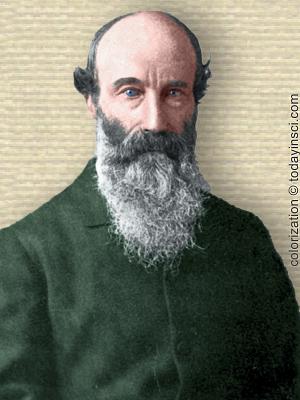 (source)
(source)
|
Thomas George Bonney
(27 Jul 1833 - 10 Dec 1923)
English geologist who was an early leader in British petrology, the study of the origin, small-scale structure, and composition of rocks. He pioneered the use of microscopic analysis of rock slices to interpret the physical geography of the past.
|
Science Quotes by Thomas George Bonney (7 quotes)
[Microscopic] evidence cannot be presented ad populum. What is seen with the microscope depends not only upon the instrument and the rock-section, but also upon the brain behind the eye of the observer. Each of us looks at a section with the accumulated experience of his past study. Hence the veteran cannot make the novice see with his eyes; so that what carries conviction to the one may make no appeal to the other. This fact does not always seem to be sufficiently recognized by geologists at large.
— Thomas George Bonney
'The Anniversary Address of the President', Quarterly Journal of the Geological Society of London, 1885, 41, 59.
[Modern science] passed through a long period of uncertainty and inconclusive experiment, but as the instrumental aids to research improved, and the results of observation accumulated, phantoms of the imagination were exorcised, idols of the cave were shattered, trustworthy materials were obtained for logical treatment, and hypotheses by long and careful trial were converted into theories.
— Thomas George Bonney
In The Present Relations of Science and Religion (1913, 2004), 3
Perfect concordance among reformers is not to be expected; and men who are honestly struggling towards the light cannot hope to attain at one bound to the complete truth. There is always a danger lest the fascination of a new discovery should lead us too far. Men of science, being human, are apt, like lovers, to exaggerate the perfections and be a little blind to the faults of the object of their choice.
— Thomas George Bonney
'The Anniversary Address of the President', Quarterly Journal of the Geological Society of London, 1885, 41, 55.
Pressure, no doubt, has always been a most important factor in the metamorphism of rocks; but there is, I think, at present some danger in over-estimating this, and representing a partial statement of truth as the whole truth. Geology, like many human beings, suffered from convulsions in its infancy; now, in its later years, I apprehend an attack of pressure on the brain.
— Thomas George Bonney
In 'The Foundation-Stones of the Earth’s Crust', Nature, 1888, 39, 93.
That theory is regarded by some enthusiastic opponents, as already on the threshold of the limbo appointed for exploded hypotheses.
— Thomas George Bonney
In Bonney’s Appendix II, 'Summary of the Principal Contributions to the History of Coral Reefs Since The Year 1874' added to Charles Darwin, The Structure and Distribution of Coral Reefs (3rd Ed., 1889), 323-324. “That theory” is Darwin’s theory of the formation of coral reefs. Bonney summarizes the arguments of the “enthusiastic opponents” and then gives his reasons for disagreeing with those opponents.
The increasing technicality of the terminology employed is also a serious difficulty. It has become necessary to learn an extensive vocabulary before a book in even a limited department of science can be consulted with much profit. This change, of course, has its advantages for the initiated, in securing precision and concisement of statement; but it tends to narrow the field in which an investigator can labour, and it cannot fail to become, in the future, a serious impediment to wide inductive generalisations.
— Thomas George Bonney
Year Book of Science (1892), preface, from review in Chemical News and Journal of Physical Science (14 Apr 1892), 65, 190.
We may be sure, that if Lyell were now living he would frankly recognize new facts, as soon as they were established, and would not shrink from any modification of his theory which these might demand. Great as were his services to geology, this, perhaps, is even greater—for the lesson applies to all sciences and to all seekers alter knowledge—that his career, from first to lost, was the manifestation of a judicial mind, of a noble spirit, raised far above all party passions and petty considerations, of an intellect great in itself, but greater still in its grand humility; that he was a man to whom truth was as the “pearl of price,” worthy of the devotion and, if need be, the sacrifice of a life.
— Thomas George Bonney
Conclusion in Charles Lyell and Modern Geology (1895), 213.
See also:
- 27 Jul - short biography, births, deaths and events on date of Bonney's birth.



 In science it often happens that scientists say, 'You know that's a really good argument; my position is mistaken,' and then they would actually change their minds and you never hear that old view from them again. They really do it. It doesn't happen as often as it should, because scientists are human and change is sometimes painful. But it happens every day. I cannot recall the last time something like that happened in politics or religion.
(1987) --
In science it often happens that scientists say, 'You know that's a really good argument; my position is mistaken,' and then they would actually change their minds and you never hear that old view from them again. They really do it. It doesn't happen as often as it should, because scientists are human and change is sometimes painful. But it happens every day. I cannot recall the last time something like that happened in politics or religion.
(1987) -- 


